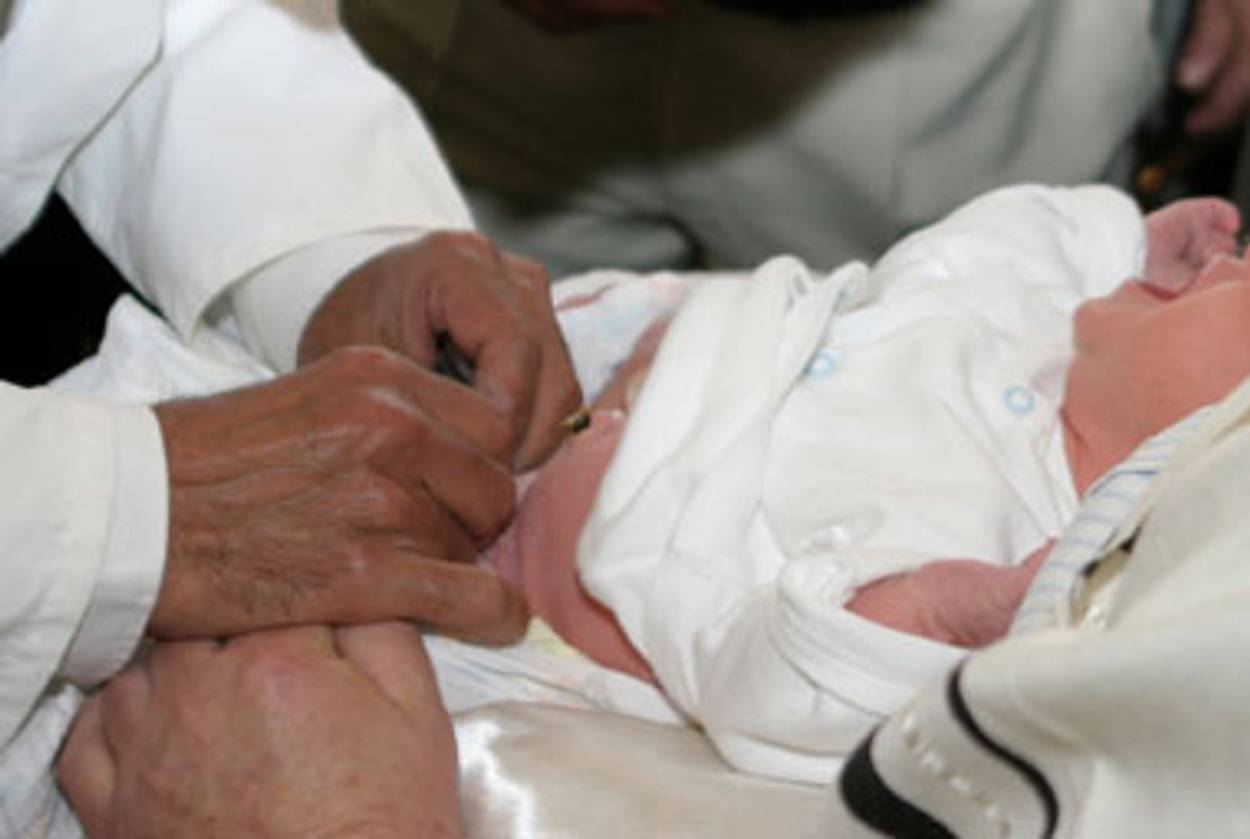First Cut
As the CDC considers recommending circumcision, a look at the history and purpose of the procedure




For most of the last half-century, the circumcision rate for newborn American boys was higher than anywhere in the Western world. A post-World War II public health campaign resulted in a rate of around 80 percent. But that number has fallen precipitously in recent years, and now the Centers for Disease Control and Prevention may try to increase it by recommending circumcision for all newborn boys. Promoting the practice in Africa, the centers say, has reduced the rate of HIV transmission there, as The New York Times reported yesterday. Tablet Magazine spoke to Melvin Konner, an anthropologist, physician, and the author of Nextbook Press’s The Jewish Body, about the CDC plan and about foreskin removal through the ages.
What do you think of the CDC’s proposal?
I have to say that in the United States, the public health argument is weak compared to the right of people to decide whether to do it or not. There is clear evidence that circumcision reduces HIV in Africa, and I think it’s a good idea to promote male circumcision in Africa, where AIDS is devastating whole countries. But in the United States, there’s not a clear and pressing public-health advantage to circumcise. And the intervention is great. It seems to change sexual pleasure; it certainly changes the appearance of the penis. People in different cultures have different aesthetic values around this. And that doesn’t seem to be considered in the cost-benefit analysis. They’re not thinking about the cultural issues and the sense of imposition that this could have for some people.
It seems like odd timing, given the uproar over health care reform. Rush Limbaugh is already saying, “Leave our penises alone, too, Obama!”
That’s where I put on my Jewish hat and start worrying that you’re going to get some nasty things said about Jewish influence on medicine. Male babies in many cultures are circumcised, including in Islam and many African cultures, but in the West it’s associated with Jews. Although I think most of the opposition to circumcision is not really in any sense anti-Semitic, there’s a fringe that thinks somehow this has been imposed on the American baby by the Jews because there are so many Jewish doctors.
Do we know why, historically speaking, Jews began circumcising their infant boys?
Wherever it comes from, it’s not unique to the Jews, and there’s no reason to believe it originated with the Jews. The Aborigines of Australia do it, the Merina of Madagascar, the Xhosa in South Africa, the Luo in Kenya, which is the tribe President Obama’s father is from. That means there’s something about the foreskin that caught people’s attention. With all the evidence now coming in from Africa, I’m starting to think people around the world might have made the connection between the foreskin and sexually transmitted infection. In many of these cultures, the rite of circumcision has something to do with fertility. Some say it makes the man more fertile, some say it makes his penis harder, many say it makes him a man.
Is Judaism unusual in connecting the circumcision ritual to a covenant with God rather than to fertility?
I’d say it is. However I’d also have to say, look at the other side of the covenant: “Your offspring will be as numerous as the stars.” The other side of the deal is fertility. And lo and behold, the Jews are still here.
So circumcision is responsible for the survival of the Jewish people?
Circumcision as a public-health measure is not responsible for the survival of the Jewish people. But circumcision as a way of making people distinctive and showing very dramatically that you care about your relationship to God might be. I’ll never forget the look on my wife’s face when my son was taken out of her arms by a mohel. There she was, standing by, watching a piece being cut out of his body and not being able to intervene to protect him. I wasn’t taking any chances and I found a guy who was a board-certified pediatrician, board-certified obstetrician, and religiously certified mohel. And when I asked him what he thought of the medical value, he said, “There isn’t any. If you’re not doing this for religious reasons, don’t do it.” But I do think all Jews should do it, whether they’re religious or not, because it’s one of the oldest and most clear and symbolically powerful definitions of Jewish identity.
Marissa Brostoff, a doctoral student in English at the CUNY Graduate Center, is a former staff writer at Tablet and the Forward.
Ari M. Brostoff is Culture Editor at Jewish Currents.